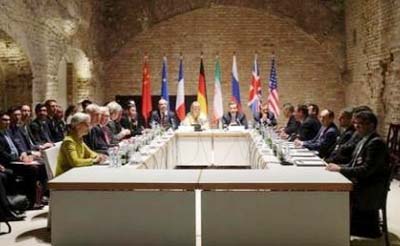
Reuters, New York :
Iran is trying to avoid detailed commitments. The French are sticking to their tough line. And US President Barack Obama faces a battle to sell any deal to a skeptical Congress.
Despite those and other obstacles, negotiators appear increasingly likely to clinch an historic deal to restrict Iran’s nuclear program for at least a decade in exchange for relief from sanctions, Western and Iranian officials said.
US officials, including Obama, have long said they see at best a 50-50 chance of getting a deal with Iran.
That remains the official line, but diplomats close to the talks tell Reuters the chances are higher than that as foreign ministers and other negotiators head to Vienna next week for the final stage of a nearly two-year process.
Driving the cautious optimism, they say, is not so much progress made in overcoming sticking points as the intense political pressure on the US and Iranian delegations to reach a deal that would end the 12-year nuclear stand-off between Iran and the West.
“We can’t rule out failure, but … it seems more likely that we will get something. Not by June 30, but perhaps in the days that follow,” a senior Western official told Reuters, referring to the planned deadline for a deal.
Another Western official said: “I think there will be an agreement because the two most important players need it.”
Six world powers – the United States, Britain, France, Germany, Russia and China – aim to stop Iran from gaining the capacity to develop a nuclear bomb. In return, they would lift international sanctions that have crippled Iran’s economy.
A preliminary agreement reached in early April left major differences for negotiators to bridge, including the verification regime to ensure Iranian compliance with a deal and the timetable for lifting sanctions.
While acknowledging such issues were far from being resolved and could lead to problems and delays, diplomats said there was a willingness to compromise.
Securing a nuclear deal is politically vital for Obama and his Iranian counterpart Hassan Rouhani.
Iran is trying to avoid detailed commitments. The French are sticking to their tough line. And US President Barack Obama faces a battle to sell any deal to a skeptical Congress.
Despite those and other obstacles, negotiators appear increasingly likely to clinch an historic deal to restrict Iran’s nuclear program for at least a decade in exchange for relief from sanctions, Western and Iranian officials said.
US officials, including Obama, have long said they see at best a 50-50 chance of getting a deal with Iran.
That remains the official line, but diplomats close to the talks tell Reuters the chances are higher than that as foreign ministers and other negotiators head to Vienna next week for the final stage of a nearly two-year process.
Driving the cautious optimism, they say, is not so much progress made in overcoming sticking points as the intense political pressure on the US and Iranian delegations to reach a deal that would end the 12-year nuclear stand-off between Iran and the West.
“We can’t rule out failure, but … it seems more likely that we will get something. Not by June 30, but perhaps in the days that follow,” a senior Western official told Reuters, referring to the planned deadline for a deal.
Another Western official said: “I think there will be an agreement because the two most important players need it.”
Six world powers – the United States, Britain, France, Germany, Russia and China – aim to stop Iran from gaining the capacity to develop a nuclear bomb. In return, they would lift international sanctions that have crippled Iran’s economy.
A preliminary agreement reached in early April left major differences for negotiators to bridge, including the verification regime to ensure Iranian compliance with a deal and the timetable for lifting sanctions.
While acknowledging such issues were far from being resolved and could lead to problems and delays, diplomats said there was a willingness to compromise.
Securing a nuclear deal is politically vital for Obama and his Iranian counterpart Hassan Rouhani.

